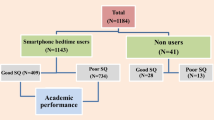Abstract
Purpose
Questionnaires are indispensable tools in epidemiologic studies and clinical surveys. Many questionnaires focusing on sleep disorders have been described in the literature. This cross-sectional study is aimed to assess the consistency and reliability of the Brazilian Portuguese Version of the Mini-Sleep Questionnaire (MSQ-BR).
Methods
Self-administered questionnaires were given to a sample of 1,108 undergraduate students. The variables collected were age, gender, socioeconomic level, and MSQ-BR scores. A subgroup of 53 students was randomly chosen to test the test–retest reliability of the instrument. Internal consistency of total MSQ-BR and its subscales (i.e., insomnia and hypersomnia) was evaluated using Cronbach’s alpha coefficient.
Results
Our results showed good internal consistency of total MSQ-BR score, with a Cronbach’s alpha value of 0.770. The insomnia subscale had an adequate internal consistency (Cronbach’s alpha, 0.749). On the other hand, the hypersomnia subscale had moderate internal consistency (Cronbach’s alpha, 0.624). The test–retest analysis showed good reliability of the instrument using Pearson’s correlation coefficient.
Conclusions
The MSQ-BR has adequate internal consistency and test–retest reliability. The MSQ-BR insomnia has adequate internal consistency for use as a separate application. However, the MSQ-BR hypersomnia demonstrated only moderate internal consistency for use as a separate application. Our intention was not to introduce modifications to the questionnaire, but to evaluate the reliability of total MSQ-BR and its subscales. Others studies are needed to assess the consistency of MSQ compared to other instruments.
Similar content being viewed by others
References
Roth T, Roehrs T, Costa e Silva JA, Chase MH (1999) Public health and insomnia: consensus statement regarding its status and needs for future actions. Sleep 22:417–420, Report of an International Consensus Conference, 1996
Pires MLN, Benedito-Silva AA, Mello MT, Del Giglio S, Pompeia C, Tufik S (2007) Sleep habits and complaints of adults in the city of Sao Paulo, Brazil, in 1987 and 1995. Braz J Med Biol Res 40:1505–1515
Pekmezovic T (2007) Epidemiology of sleep disturbances. Glas Srp Akad Nauka 49:25–33
International Classification of Sleep Disorders (ICSD) (2005) Diagnostic and coding manual revised, Vol. 2. American Sleep Disorders Association, Minn, pp 99–101, Diagnostic Steering Commitee, Thorpy MJ, Chairman Rochester
Buysse DJ, Angst J, Ajdacic V, Eich D, Rossler W (2008) Prevalence, course, and comorbidity of insomnia and depression in young adults. Sleep 31:473–480
Ohayon MM (2007) Prevalence and comorbidity of sleep disorders in general population. Rev Prat 37:1521–1528
Fetveit A, Straand J, Blorvatn B (2008) Sleep disturbances in an artic population: the Tromso Study. BMC Health Serv Res 8:117
Morphy H, Dunn KM, Lewis M, Boardman HF, Croft PR (2007) Epidemiology of insomnia: a longitudinal study in a UK population. Sleep 30:274–280
Douglass AB, Bornstein R, Nino-Murcia G, Keenan S, Miles L, Zarcone VP Jr, Guilleminault C, Dement WC (1994) The Sleep Disorders Questionnaire. I: creation and multivariate structure of SDQ. Sleep 17:160–167
Buysse DJ, Reynolds CF, Monk TH, Berman SR, Kupfer DJ (1989) The Pittsburgh Sleep Quality Index: a new instrument for psychiatric practice and research. Psychiat Res 28:193–213
Partinen M, Gislason T (1995) Basic Nordic Sleep Questionnaire (BNSQ): a quantitated measure of subjective sleep complaints. J Sleep Res 4:150–155
Johns MW (1991) A new method for measuring daytime sleepiness: the Epworth sleepiness scale. Sleep 14:540–545
Zomer J, Peled A-H, Rubin E, Lavie P (1985) Mini-sleep Questionnaire (MSQ) for screening large populations for EDS complaints. In: Koella WP, Rüther E, Schulz H (eds) Sleep '84: Proceedings of the Seventh European Congress on Sleep Research. Fischer, Stuttgart, pp 467–470
Gorestein C, Tavares S, Aloe F (2000) Sleep self-evaluation questionnaires. In: Gorestein C, Andrade LHS, Zuard AW (eds) Clinical evaluation scales in psychiatry and psycopharmacology. Lemos, Sao Paulo, pp 423–434
Shochat T, Tzischinsky O, Oksenberg A, Peled R (2007) Validation of the Pittsburgh Sleep Quality Index Hebrew Translation (PSQI-H) in a sleep clinic sample. IMAJ 9:853–856
Bland JM, Altman DG (1997) Cronbach's alpha. BMJ 314:572
Cohen M, Abraham K (2006) Cognitive-behavior group intervention for relatives of cancer patients: a controlled study. J Psychosom Res 61:187–196
Klein E, Koren D, Arnon I, Lavie P (2003) Sleep complaints are not corroborated by objective sleep measures in post-traumatic stress disorder: a 1-year prospective study in survivors of motor vehicle crashes. J Sleep Res 12:35–41
Coren S (1994) The prevalence of self-reported sleep disturbances in young adults. Int J Neurosci 79:67–73
Carney CE, Edinger JD, Meyer B, Lindman L, Istre T (2006) Daily activities and sleep quality in college students. Chronobiol Int 23:623–637
Acknowledgments
We gratefully acknowledge the undergraduate students of the Liga Acadêmica Multidisciplinar de Neurologia e Neurocirurgia da Universidade de Caxias do Sul: Maira Basso, Marcio F. Spagnól, Viviane M. Vedana e Luzia F. Lucena.
Conflict of interests
The authors declare no conflict of interests.
Financial support
The authors declare no financial support.
Author information
Authors and Affiliations
Corresponding author
Rights and permissions
About this article
Cite this article
Falavigna, A., de Souza Bezerra, M.L., Teles, A.R. et al. Consistency and reliability of the Brazilian Portuguese version of the Mini-Sleep Questionnaire in undergraduate students. Sleep Breath 15, 351–355 (2011). https://doi.org/10.1007/s11325-010-0392-x
Received:
Revised:
Accepted:
Published:
Issue Date:
DOI: https://doi.org/10.1007/s11325-010-0392-x




